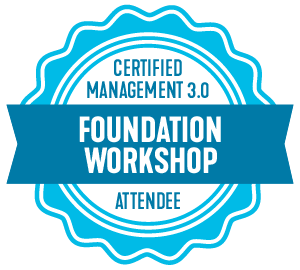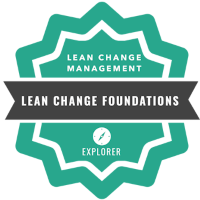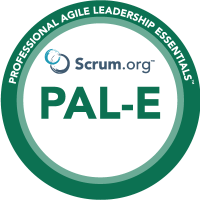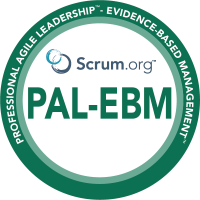Inside the category “Change and Organization Management” we present courses that are the foundation for successful operation and existence of any modern organization. Courses cover areas related to motivation of co-workers, their competence development, empowerment delegation, scaling organizational structures as well as strategic objectives.
To already very wide range of topics we need to add concrete management methods, based on Agile and Lean approaches and strategies for introducing and rooting change inside organization. This category contains of a compendium of knowledge for every manager and leader who wants to manage the system and not humans, thus building a healthy and agile organization.
Look below for specific courses and if necessary you can always ask us for an advice what to choose!

Management 3.0 Foundation
What is Management 3.0 Foundation™ training?
The Management 3.0 Foundation training is the most frequently chosen training in the Management 3.0 family, the first and at the same time revolutionary one, changing the paradigm of modern management and leadership.
Management 3.0 is a unique program dedicated for people open for improvement of their approach to management. Training participants are those who usually notice that their organization lacks employee engagement and team collaboration. Those people decide to look for solutions and get involved in solving the problem instead of just complaining about it.
Management 3.0 is an innovation, leadership and the highest level of management. Management 3.0 redefines leadership, in which management is simply a collective responsibility.
It’s about cooperation, which aims to find the most efficient way to achieve business goals thanks to the satisfaction of employees, which Management 3.0 makes a priority.
Do you want to have practical knowledge, learn a good approach to your team that will increase employee engagement and improve the organization’s performance? We have something for you!
Who is behind this?
Management 3.0 was created by a specialist and enthusiast in the field of management Jurgen Appelo, who published a book of the same title in 2010. Since then, Management 3.0 has become a global movement associated with a new reflection and approach to management.
Over 400 facilitators support the development of management every day around the world by organizing practical training that offer games, simple tools and best practices. Thanks to them, participants gain new skills that can be easily used to increase the engagement of their employees and to inspire changes in team managing.

OKRs Essentials
What is the OKRs Essentials training?
OKRs Essentials is an authorial program dedicated to people looking for a modern approach to co-creating organizational goals. Goals that inspire, allow you to align and synchronize multiple work streams, and most of all engage colleagues. This program is based on the compilation of knowledge from the accredited Management 3.0 Foundation training and the hands-on experience of our experts as an OKR Consultant, OKR Champion and Agile Coach.
The proper use of the Objectives and Key Results concept, commonly known as OKRs, allows to build transparency of organizational objectives, enabling setting priorities and minimizing the risk of conflict or exclusion of organizational goals, which, paradoxically, still takes place in many organizations. On the other hand, proper following of planning, monitoring and review meetings cadence allows for dynamic adaptation of the scope of activities (initiatives), without redefining the objectives. This minimizes the overhead of creating an endless collection of report slides, increases the teams’ focus on the essence of goals and as a result - enables the achievement of the organization’s business goals.
Are you fed up with dry theories and silver bullets that supposedly would magically solve your problems with achieving organizational goals? Do you want to gain practical knowledge, learn valuable methods and best practices of co-creating and aligning objectives? We have something for you!
Who is behind this?
The concept of OKRs - Objective and Key Results has its roots in the Intel organization, where the concept has been developed and disseminated since 1975 by Andy Grove, based on a modified MBO approach, which was developed even earlier by Peter Drucker. Then John Doerr (participant of Grove’s seminar) applied in 1999 the concept of OKRs, among others, in Google, highlighting
that it was OKRs that allowed them to achieve global success and scale from 40 to 50,000 people.
Currently, new OKRs experts and consultants are appearing all over the world, but it is worth noting that not all of them follow the idea of modern Agile Leadership. To fill this gap, in 2015 OKRs also became part of the Management 3.0 concept developed by Jurgen Appelo. OKRs in Management 3.0 are based on 12 principles for building a system of goals and measures in such a way as to engage colleagues and give them a sense of agency.

Lean Change Management
What is the Lean Change Management™ training?
As innovation and market disruption continue to increase, more and more organizations are looking for ways to change faster to stay competitive.
Many of these organizations are looking towards Agile Management to achieve this, but most often use outdated change management methods that are not adapted to dynamic change.
This accredited training program (Lean Change Agent) aims to show how to use the Agile and Lean approach not (only) to develop products/services, but to facilitate organizational transformations. Lean Change Management™ is a modern framework that uses the ideas of Lean Startup, Agile, Lean and Kotter's model to help you adaptively manage change.
Change Agents are extraordinary people with an entrepreneurial heart, visionary mind and courage necessary to undermine the status quo for the benefit of the entire organization.
Discover engaging practices and lightweight tools for planning/improving change and learn to lead a group of change agents. As a result the change will reinforce and will be propagated by coworkers.
Who is behind this?
Jason Little is an expert in managing organization change, his approach was described in a book published in 2014 entitled Lean Change Management™. On the basis of the book, a training and consulting program emerged, followed by a global movement related to the new reflection and approach to change management.
Every day, more than 50 facilitators around the world contribute to the development of modern change management by organizing practical trainings that offer games, simple tools and best practices. Thanks to them, participants gain new skills that they can easily use to increase the success of radical organizational changes and engage people to achieve shared responsibility for their success.

Professional Agile Leadership Essentials
What is Professional Agile Leadership Essentials™ (PAL-E) training?
Professional Agile Leadership Essentials™ is an accredited training from Scrum.org, based on hands-on exercises, during which managers and leaders of agile teams will understand how to best support and teach teams and organization to create the desired environment for agility.
In an agile organization, leaders, managers, supervisors and members of agile teams are required to change the way they manage and measure work results. Agile teams might not be able to do it on their own. Help is needed from the organization. The way people think about how they approach work needs to become agile. Better results can be achieved by unifying goals and the ways of working.
During the training, participants delve into the role that leaders play in creating the proper environment for agility. The role of leader and manager in an agile organization can be very different from what leaders are used to. Through team exercises, participants will learn how to initiate and support agile teams to achieve better results and how to lead change in the area of organizational culture that must be introduced to bring the organization closer to agile product delivery.
Who’s behind this?
Ken Schwaber and Jeff Sutherland are considered to be Scrum’s fathers, although the approach itself is based on self-organizing teams, popularized by the famous publication “The New New Product Development Game” written by Hirotaka Takeuchi and Ikujiro Nonaka, published in the Harvard Business Review in 1986.
Over 300 Scrum.org trainers around the world every day support the development of management by organizing practical training, learning through games, workshops and effective practices.

Professional Agile Leadership - Evidence-Based Management
What is the Professional Agile Leadership™ – Evidence-Based Management (PAL-EBM) training?
Professional Agile Leadership™ – Evidence-Based Management is an accredited training from Scrum.org that builds competence in the use of the Evidence-Based Management™ (EBM) framework. It is an agile approach designed to help leaders lead teams to improve business value delivery for the customer and constantly increase organizational efficiency.
In a world of rapidly changing customer needs, organizations must quickly adapt to new challenges and opportunities. This requires information and data that will help increase business agility. Unfortunately, organizations that develop products in an agile way usually use the classic approach to managing goals and measuring the progress toward assumed plans with lagging indicators.
Evidence-Based Management focuses on delivering value for the customer and conscious experimentation in order to improve the effectiveness of the organization and help achieve its strategic goals. Each participant will complete the training with his/her own plan for making changes in the context of creating goals in a reality of high uncertainty.
Who’s behind this?
Ken Schwaber i Jeff Sutherland uważani są za ojców Scruma, chociaż samo podejście bazuje na samoorganizujących się zespołach, spopularyzowanym przez słynną publikację “The New New Product Development Game” Hirotaka Takeuchi i Ikujiro Nonaka, wydaną w Harvard Business Review w 1986 r.
Over 300 Scrum.org trainers around the world every day support the development of management by organizing practical training, learning through games, workshops and effective practices.



